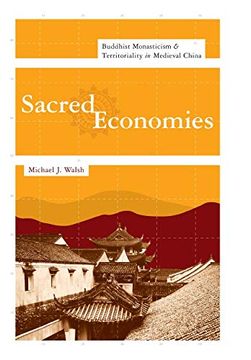Share
Sacred Economies: Buddhist Monasticism and Territoriality in Medieval China (The Sheng yen Series in Chinese Buddhist Studies) (in English)
Michael J. Walsh (Author)
·
Columbia Univ Pr
· Hardcover
Sacred Economies: Buddhist Monasticism and Territoriality in Medieval China (The Sheng yen Series in Chinese Buddhist Studies) (in English) - Michael J. Walsh
$ 78.95
$ 107.14
You save: $ 28.20
Choose the list to add your product or create one New List
✓ Product added successfully to the Wishlist.
Go to My Wishlists
It will be shipped from our warehouse between
Wednesday, May 29 and
Thursday, May 30.
You will receive it anywhere in United States between 1 and 3 business days after shipment.
Synopsis "Sacred Economies: Buddhist Monasticism and Territoriality in Medieval China (The Sheng yen Series in Chinese Buddhist Studies) (in English)"
Buddhist monasteries in medieval China employed a variety of practices to ensure their ascendancy and survival. Most successful was the exchange of material goods for salvation, as in the donation of land, which allowed monks to spread their teachings throughout China. By investigating a variety of socioeconomic spaces produced and perpetuated by Chinese monasteries, Michael J. Walsh reveals the "sacred economies" that shaped early Buddhism and its relationship with consumption and salvation.Centering his study on Tiantong, a Buddhist monastery that has thrived for close to seventeen centuries in southeast China, Walsh follows three main topics: the spaces monks produced, within and around which a community could pursue a meaningful existence; the social and economic avenues through which monasteries provided diverse sacred resources and secured the primacy of Buddhist teachings within an agrarian culture; and the nature of "transactive" participation within monastic spaces, which later became a fundamental component of a broader Chinese religiosity. Unpacking these sacred economies and repositioning them within the history of religion in China, Walsh encourages a different approach to the study of Chinese religion, emphasizing the critical link between religious exchange and the production of material culture.
- 0% (0)
- 0% (0)
- 0% (0)
- 0% (0)
- 0% (0)
All books in our catalog are Original.
The book is written in English.
The binding of this edition is Hardcover.
✓ Producto agregado correctamente al carro, Ir a Pagar.

